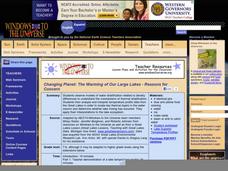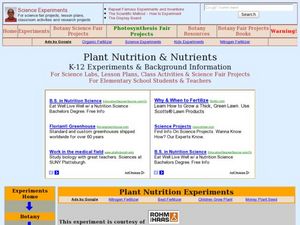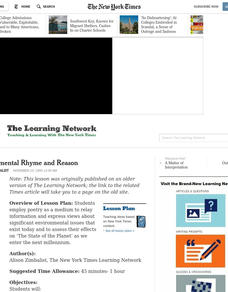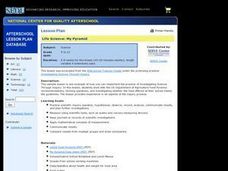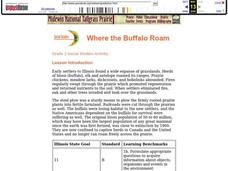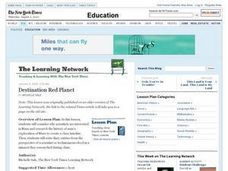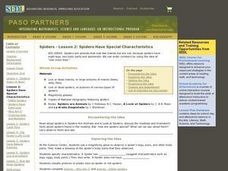Curated OER
Changing Planet: The Warming of Our Large Lakes - Reasons for Concern
Another A+ lesson on the impact of climate change comes to you from the National Earth Science Teachers Association. In this installment, learners model the stratification of water in lakes due to temperature differences. The lab also...
Benjamin Franklin Tercentenary
Let’s Throw an Electric Science Party!
Are you looking for a shockingly good lesson? Check out one that has middle schoolers recreate four of Benjamin Franklin's experiments. Groups investigate, observe, and draw conclusions about static electricity and electrical current....
Curated OER
Prairie Plant Investigation
Students carefully observe prairie plants and record their observations in a science journal. They examine the root systems of grasses and flowers and surmise how these plants can grow together on the prairie.
Curated OER
I Wonder How the Manduca Life Cycle Compares To the Human Life Cycle...
Students study life cycles including developing their understanding of the human life cycle. They decide where they are in the human life cycle and provide reasons for that placement. They compare the human life cycle to that of the...
Curated OER
Plant Nutrition and Nutrients
Students observe seeds growth and examine the different parts of the seedling. In this biology lesson, students compare the growth of seeds planted in soil and in hydroponics. They record their observations in their science journal and...
Virginia Department of Education
Logic and Conditional Statements
If there is a conditional statement, then there is a hypothesis and conclusion. Pupils learn how to identify the parts of conditional statements. Class members continue to work with conditional statements and rewrite them in their many...
Curated OER
LP 6--8: Xenopus laevis (frog) Development for a 7th Grade Audience
Seventh graders view lab stations with Xenopus at different stages of development. They identify the life stage of the sample, as well as the previous and next stages. Students must explain their reason for selecting the specific stage.
Curated OER
Earth Science: In Depth Look at Earthquakes
Learners engage in an interactive Internet instructional activity covering the reasons and results of earthquakes. After reading eyewitness accounts and viewing animations, they use seismograms to measure and locate the epicenters. In an...
Curated OER
Environmental Rhyme and Reason
Learners employ poetry as a medium to relay information and express views about significant environmental issues that exist today and to assess their effects on The State of the Planet as we enter the next millennium.
Virginia Department of Education
Historical Models of Atoms
What does the past have to do with today? Young scientists find that answer as they learn more about past chemists and their significant contributions to the field. Pupils use the Internet to research historical figures...
Virginia Department of Education
Laboratory Safety and Skills
Avoiding lab safety rules will not give you super powers. The lesson opens with a demonstration of not following safety rules. Then, young chemists practice their lab safety while finding the mass of each item in a mixture and trying to...
Curated OER
Weather Observation Journal
Students record weather for a period of one month. In this weather lesson, students observe weather for one month on a large pictograph. Students record clouds, wind, temperature and any other weather conditions they observe. Students...
Curated OER
Life Science: Heavy Weight
High schoolers investigate adolescent obesity and its health impact. In this health and obesity instructional activity, students research the problem, develop a survey regarding eating habits, then analyze the nutritional information on...
Curated OER
Life Science: My Pyramid
Students examine how the school food program compares to the food pyramid recommendations. For this food pyramid lesson, students compile data regarding the food choices available in the school through the lunch program and vending...
Curated OER
Where the Buffalo Roam
Second graders explore what life in the Chicago area was like hundreds of years ago. They discuss how settlers impacted the environment, and why there are no longer herds of buffalo in the Chicago area today. They read an article and...
Curated OER
How Does Your Garden Grow?
Students discover gardening by documenting plants grown on school grounds. In this botany instructional activity, students utilize digital cameras to capture images of plants on photo hikes which are turned into a slide show....
Curated OER
How to Keep a Scientific Journal
Students record observations of a living organism over a period of time. They observe meal worms and record their observations in a scientific journal.
Curated OER
Creating Journals
Students take a virtual tour of Yosemite and selects photographs to use in their journal.
Curated OER
Science: The Changing Life of Air Pressure
Fourth graders observe demonstrations how heated air rises and becomes a low pressure area. After watching several teacher-conducted experiments, 4th graders, in groups, discuss and answer questions in their journals. Finally, they...
Curated OER
Destination Red Planet
Young scholars explore reasons why people are interested in exploring other planets. After reading an article, they identify developments in the mission to Mars. Using the internet, they research the history of exploring Mars and...
Curated OER
Measuring the Earth (Eratoshenes' method)
Sixth graders engage in problem solving, communicating, reasoning, and connecting to represent and solve problems, using geometric models.
Curated OER
Migration
Students study reasons for and examples of bird migration as a behavioral adaptation. They investigate the Bernoulli's Principles.
Curated OER
Spiders Have Special Characteristics
Students state reasons why spiders are grouped in specific categories, including what distinguishes a spider from an insect. They report on their observations of the spiders. They illustrate their report with drawings in their journals.
Curated OER
When Dinosaurs Ruled The World
Students discover how a paleontologist digs up fossils and what tools they use. In this paleontology lesson, students discuss the importance of the job of a paleontologist, watch a video on the process of extracting fossils, and...
